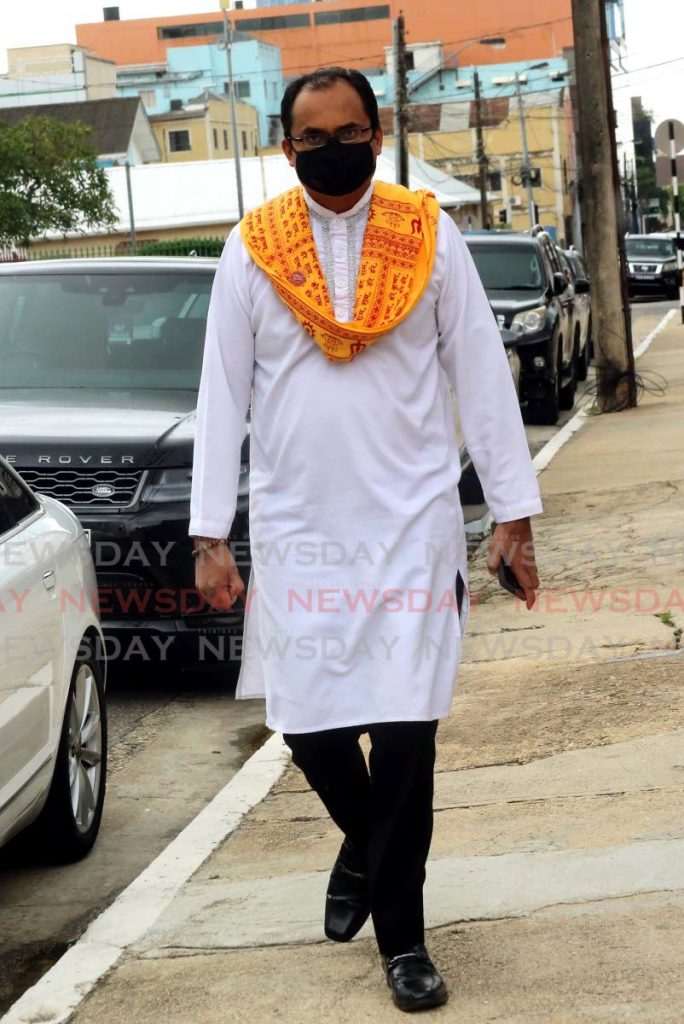Maha Sabha objects to ministry's proposal: No to sex ed

THE country's largest Hindu organisation – the Sanatan Dharma Maha Sabha – through its attorney Dinesh Rambally, has written to the Education Minister expressing concern over a proposal to introduce sex education within the primary school curriculum, including schools run by denominational boards.
The topic would be part of a broader Health and Family Life Education (HFLE) format. The proposal on the HFLE came up for discussion during the ministry's online National Consultation on Education 2020 series.
Since November 10, the ministry has been holding an online seminar on specific topics on Tuesdays and Thursdays. In all, six sessions were held.
The topics have been the Conduct of SEA and Transition to Secondary School; the Concordat; Parental Involvement in Education; Blended Learning; Curriculum Reform; and, in the last consultation held this Thursday the Teaching Service Commission.
Rambally wrote to Education Minister Dr Nyan Gadsby-Dolly, junior minister Lisa Morris-Julian and the chief education officer claiming an infringement of the rights and religious freedoms guaranteed under the Constitution and also under the 1960 Concordat, arising out of the HFLE proposal.
The Concordat is an agreement signed between the State and the major religious bodies guaranteeing autonomy to the latter on the day-to-day affairs of all denominational schools, that is, schools run by the religious bodies.
In a letter sent on Thursday, Rambally wrote, “The SDMS is concerned that any airing of sexuality and sexual health as a part of HFLE in primary schools can interfere with the stated tenets of our religious texts and beliefs.”
He said any attempt to introduce sex education in primary schools must ensure that whatever may be presented as prevailing sexual attitudes worldwide must be counterbalanced by the given religious principles of Hinduism and possibly other religions.
The issue of sex education and sexual-health education form part of a questionnaire the ministry sent to parents as it seeks to reshape the curriculum through the consultative process.
Rambally said there is a link with the Concordat and the issue speaks to the differences in roles of the denominational boards of management and the governing bodies and principals of denominational schools in areas including the teaching of religious principles.
He added that the HFLE aims to provide students with knowledge and life skills to navigate various issues including sexuality and sexual health.
Contacted for comment on Thursday evening, Rambally said because of the clear-cut rights and privileges guaranteed to the various religious bodies which run schools via the Constitution and the Concordat, the issue of sex education and the HFLE should have been discussed with the education management boards of the denominational schools, rather than through an online public consultation.
He said the issue of introducing sex-education in private schools is not a new one, and, where the Maha Sabha is concerned, was one that was strenuously resisted by now deceased Maha Sabha Secretary General Satnarayan Maharaj and will continue to be resisted by the current management of the Maha Sabha.
“We wish to ascertain that human sexuality and religious principles are not separate issues. The former is governed by the latter. We must therefore underscore that as a religious board, the SDMS’ approach to sex education must be guided by and encapsulated within the tenets of the Hindu tradition,” Rambally said in his letter to the minister.
He asserted that the SDMS is not prudish on matters of sexuality, pointing out that vast Hindu literature exists and includes the Kama Sutras – a treatise on sexuality. “But its use was never contemplated as being fit for children."
Trying to provide students with knowledge and life skills to navigate issues of sexuality and sexual health, as the ministry put it in one of the questions, does not give any real clarification as to what exactly is going to be taught in sex education classes, he said.
With so many gender distinctions and gender fluidity, there is a risk teachers may inadvertently raise unbridled curiosity and exploration among pre-pubescent and pubescent students, Rambally warned.
“This is of crucial concern to us. The very training and differing attitudes of teachers in the delivery of sex education may have many parents of primary school age children feeling rather concerned if such education is not in alignment with what is being taught in the home setting.”
For standards four and five students who will be undergoing pubescent changes, he supported discussion, possibly by a health worker, on puberty, menstruation, male and family bodily changes – “But no more.”
He said the rest is better suited to secondary-school level, where students would be a bit more mature and where teachers specialise in the different subjects.
“Any teaching of sexuality in the primary-school curriculum is naturally fraught with certain difficulties, one of which is adequate teacher training and inherent biases to sex education," said Rambally, who is also the MP for Chaguanas West.
“Attitudes to sexuality are varied, and stem from deeply rooted cultural norms of different communities in TT. It is for this reason that the SDMS believes that the first introduction to sex education should be done at the home. Hindus have always regarded the home as a premium and valid medium of education and in this time of pandemic, so it has truly become.
“As a religious community therefore, we will brook no effort to ensure that these recommended religious tenets are not subverted by the avalanche of modern sexual norms and suggestions of sexual liberty as being part of the teenage experience.”
In a brief response via WhatsApp on Thursday, Gadsby-Dolly said the HFLE is currently a part of the national school curriculum, and is not sex education.

Comments
"Maha Sabha objects to ministry's proposal: No to sex ed"